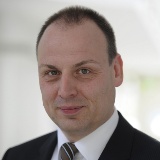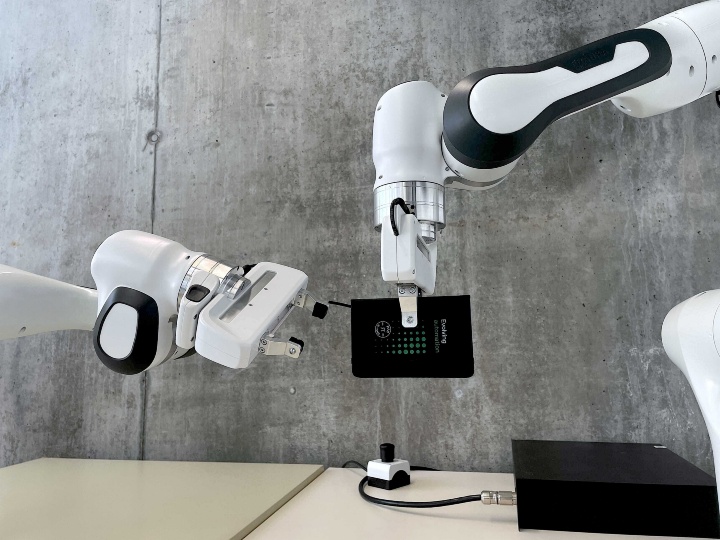Find information about lectures and laboratory courses
- Get help in organizing your study at C@MPUS.
- All course materials are available at ILIAS.
- Read official module handbooks at Bologna für Studierende.
Lectures at IAS


MOOC@TU9 is a joint project of the alliance of leading Institutes of Technology in Germany (TU9) to plan, develop and execute an English-language Massive Open Online Course (MOOC). The goal of MOOC@TU9 is to detail the quality, the variety and the different perspectives of engineering science studies in Germany. The participants receive initial insights into graduate courses of study and become familiar with the wide-ranging offers available at the TU9 Universities.
An overview on Automation Technology is provided in the lecture “Models in Mechanical and Electrical Engineering – from Smart Materials to Smart Factory”. The recordings of the lecture of Prof. Dr.-Ing. Dr. h. c. Michael Weyrich of University of Stuttgart are provided below. There are links to interviews and lectures, background information on the university as well as instructions to an exercise for students.
Module Industrial Automation Systems in MOOC@TU9
Lecturer
Prof. Dr.-Ing. Dr. h. c. Michael Weyrich
Institute of Industrial Automation and Software Engineering
Module Description
The “Industrial Automation Systems” lecture provides a glimpse of the made in Germany World of Automation Technology. Particularly, emerging technologies such as the Internet of Things currently change the way of developing and realizing manufacturing systems. Present day systems tend to be static and are difficult to alter. We will explain the automation approach of today and sketch future ideas of how automating systems work. However, intelligent components of the future would enable plug and play solutions for smart factories. In Germany, these new technologies are intensively researched supported by all related industries. Researchers, experts from industry and our students pursue this exciting goal to realize this quantum leap towards smart automation systems.
Related Videos
- Trailer of the Institute of Industrial Automation and Software Engineering
- Trailer of the University of Stuttgart
- Trailer of MOOC@TU9
Important information about the course in SoSe 2021
The IAS offers this course in SoSe 2021 completely virtually. For this purpose, materials will be made available online via ILIAS and accompanying office hours will be offered via WebEx
Learning Objectives
The students can professionally design automation projects, thoroughly understand and employ the modern used development and automation methods, and get acquainted with automation tools and peripherals. Furthermore, the attendees can understand the requirements of an operating system dedicated to industrial automation systems and implement various concepts of real time programming regarding the control of an industrial automation system.
Content
- What is industrial automation?
- Automation device systems and structures
- Process peripherals
- Real-time programming
- Mini operating system
- Programming languages
Module details
| Credit Points | 6 |
| Semester hours per week | 4 (exercise 2, lecture 2) |
| Regular interval | Summer term |
| Language | English |
| Estimate hours required | Attendance · 42 hours Self-study · 138 hours Total · 180 hours |
Contact
| Lecture Email | ia@ias.uni-stuttgart.de |
| Lecturer | |
| Assistant |
Learning Objectives
Acquire basic knowledge and skills about software engineering for embedded real-time software systems; understand the specific challenges of software engineering for real-time systems; understand the development process for real-time software from requirements to maintenance.
Content
- Introduction to real-time systems and embedded systems
- Challenges of software engineering for real-time systems
- Real-time software development process
- Analysis and design methods for real-time software
- Model-driven development, requirements engineering
- Design of real-time systems
- Software verification and validation
- Industrialization of software
- Project management
Module details
| Credit Points | 6 |
| Semester hours per week | 4 (exercise 2, lecture 2) |
| Regular interval | Winter term |
| Language | English |
| Estimate hours required | Attendance · 42 hours Self-study · 138 hours Total · 180 hours |
Contact
| Lecture Email | ser@ias.uni-stuttgart.de |
| Lecturer | |
| Assistant |
Learning Objectives
Design and analysis of modern automation systems require the application of models that can cover the heterogeneity of cyber-physical components, sophisticated operational scenarios, system autonomy, and dynamic interaction with the non-deterministic environment and human operators. This course will guide you from basic to advanced system modeling methods and demonstrate their applications on automation systems. During this course, you will learn the underlying mathematical concepts, get familiar with modern modeling and analytical software tools and libraries, and apply your knowledge to realistic examples.
Content
- Introduction to MAAS, todays trends in automation system modeling
- Relevant concepts from Boolean algebra, set theory, graph theory, and the theory of probability
- Modeling of deterministic systems: state machines, queuing networks, automata
- Modeling of concurrent systems: Petri nets family, process algebras
- Principles of model checking: transition systems, linear temporal logic, computation tree logic
- Modeling of stochastic systems: Bayesian network, Markov chains family, stochastic and generalized Petri nets
- Analysis of stochastic systems: Probabilistic model checking, probabilistic computation tree logic
- Simulative analysis: Monte Carlo, rare events, importance sampling
- Timing analysis: timed Petri nets, timed Automata, probabilistic timing analysis
- Challenges of real-world application: Semi-formal models, model-to-model transformation, countermeasures against state space explosion
Webex-Link
https://unistuttgart.webex.com/unistuttgart-en/j.php?MTID=m701640a0740d353a7e5b7282ca8c1427
Lectures - Mondays at 11:30
Exercises - Thursdays at 11:30
Module details
| Credit Points | 6 |
| Semester hours per week | 4 (exercise 2, lecture 2) |
| Regular interval | Summer term |
| Language | English |
| Estimate hours required | Attendance · 42 hours Self-study · 138 hours Total · 180 hours |
Contact
| Lecture Email | maas@ias.uni-stuttgart.de |
| Lecturer | |
| Assistant |
We are thrilled to announce the launch of a new course: Risk Assessment for Robotic Systems (RARS), available in the upcoming Summer term.
In an era where robotics play a pivotal role across multiple sectors, understanding and mitigating the associated risks, especially in complex environments and during interactions with humans, is crucial. This course explores in-depth methods and approaches for risk assessment. It covers essential theories, models, and analytical frameworks in safety, risk, and reliability, ensuring a comprehensive understanding of how to navigate and manage the intricacies of risk in dynamic and unpredictable settings.
Course Content:
The course covers foundational theories of risk and dependability, alongside qualitative risk assessment methods like FME(C)A, HAZOP, and STPA. We delve into reliability metrics of both static and dynamic quantitative risk models, including ETA, FTA, and Markov chains. More advanced topics include the use of Probabilistic Model Checkers (PMC) such as PRISM and STORM, and techniques for uncertainty quantification when modelling risk. We also explore emerging topics such as, Digital Twins (DT), and Fault Injection (FI) via Reinforcement Learning (RL). The course emphasizes practical experience with real robots and includes analysis of Artificial Intelligence components' safety and risk mitigation strategies. In short the course covers traditional approaches to assessing risks as-well-as innovative approaches to better equip students for the realities confronted in their future professional life.
Module details
Credit Points: 6
Semester hours per week: 4 (exercises 2, lectures 2)
Regular interval: Summer term
Language: English
Estimate hours required:
Attendance: 42 hours
Self-study: 138 hours
Total: 180 hours
Summer Semester 2024:
Lectures Mondays 14:00 – 15:30
Exercises Thursdays 9:45 – 11:15
Contact
Lecture email: rars@ias.uni-stuttgart.de
Lecturer: Jun.-Prof. Dr.-Ing. Andrey Morozov
Assistant: Joachim Grimstad



